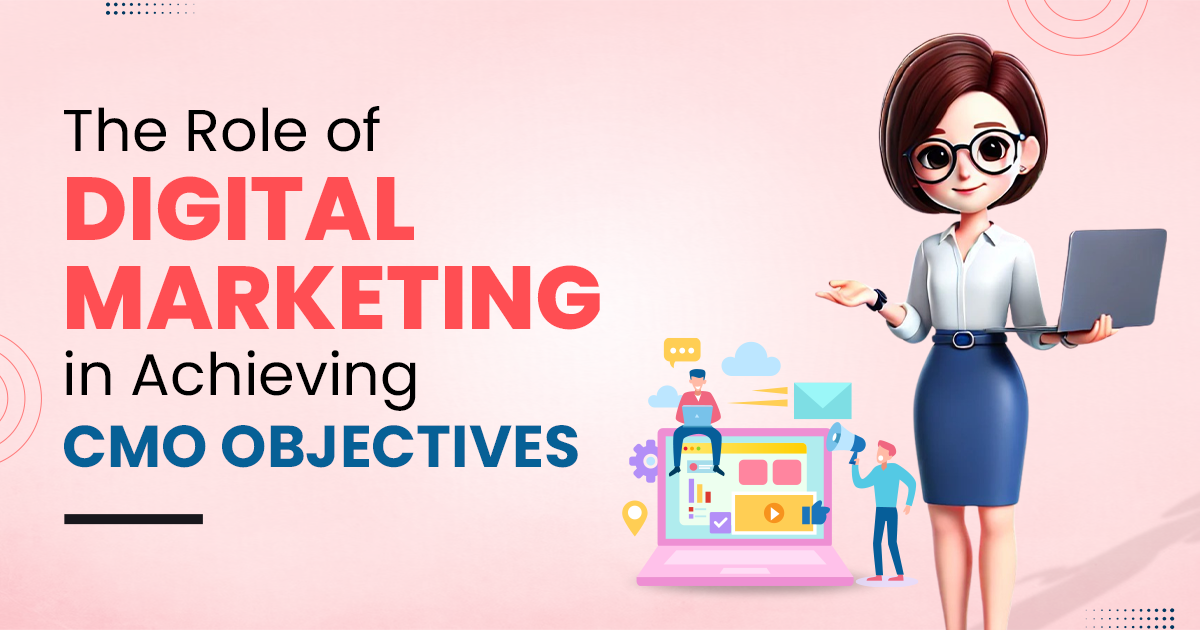The Role of Digital Marketing in Achieving CMO Objectives
In a fast pace of modern digital, things remain challenging for Chief Marketing Officers. Today, they are not expected only to raise the brand of a company but rather result in targets, revenue growth, and measurable success. In other words, CMOs are the pillar of marketing strategy in business. Their secret weapon, in this case, is digital marketing.
How exactly can a great digital strategy help CMOs achieve their objectives? Let’s find out.
Building a Strong Brand Presence
No brand wants to be lost in the noise, but then again in the over-crowded online space, that is easier said than done. Digital marketing gives CMOs all the strong tools in order to make a point with your message to the relevant audience. One of these strategies under digital is SEO and content marketing to make sure that your brand isn’t lost in the noise.
With SEO, there’s a greater possibility that your company will appear on the first page when searching through Google. And honestly, if you don’t see it, you basically don’t.
Content marketing—be it blog posts, videos, or social media—is the way in which you express your brand values, how you’re best at what you do, and your brand story, all at once, resonating with your audience.
Better Data-Driven Decisions
It used to be pure guesswork when doing marketing, but the beauty of digital marketing is that you can really see it happening. That is the strength of any good digital campaign: real-time information. The great thing about this is that CMOs no longer have to count on intuition; they will know what is working and what is not.
Tools for analytics such as Google Analytics or HubSpot can track nearly everything, from behavior of customers to conversion rates.
AI powered insights make your campaigns more targeted and effective as you go on.
Outcome: More effective decision-making based on actual performance.
Qualify Leads
Leads are essentially the lifeblood of any business, and the CMO constantly looks for new avenues in order to increase the number of qualified prospects coming into the system. Here’s where digital marketing really comes into the forefront. Digital tools such as PPC ads, email marketing, and social media targeting help a CMO zero in on the most relevant customer segments.
Instead of casting a wide net in the hopes of catching something, CMOs can attract the exact types of leads most likely to convert into loyal customers. This translates to less money wasted and more bang for your marketing buck.
Better Customer Engagement
Once the leads come your way, you need to keep them coming back for more. Digital interfaces are quite apt platforms for building long-term relationships with customers. Whether it’s through constant engagement via social media, email campaigns that tailor interaction, or interactive content such as polls and quizzes, digital marketing helps keep brands in the shopper’s consciousness.
With social media, you are not speaking to your audience. You are speaking with your audience. This makes your brand more accessible and trustworthy.
Customer Engagement: Hitting touch points with the customer through relevant content or direct dialogue spurs loyalty and long-term, connection-based relationships
Enhancing the ROI
It’s time in the very end to generate revenue. Digital marketing is transparent and accountable. CMOs can easily measure the ROI and strategically tweak things around for better outcomes.
Tools such as Google Ads or Facebook Ads Manager help trace exactly where every dollar is going, what works and does not, and how to reshuffle resources for maximum effect.
FAQs
Conclusion
Digital marketing offers something rather more than yet another point in the CMO’s bag of tricks: it connects everything. This means building a brand, generating leads, holding customers’ engagement through to improving the ROI: digital marketing delivers on all the objectives in a measurable, scalable, and impactful way. In this regard, the ability represents an absolute leadership requirement for CMOs who want to navigate the future of their organization.

